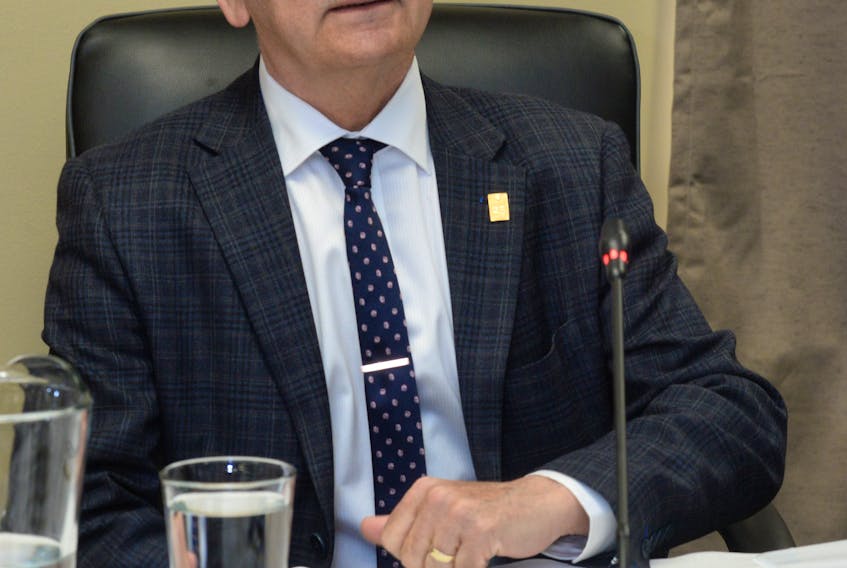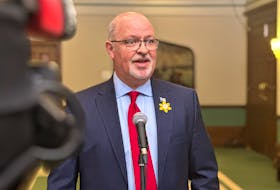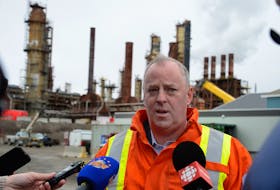ST. JOHN'S, N.L. — George Jergeas could tell you a lot about why construction megaprojects have a reputation for running over budget. To start, he says, look at the management decisions, and look at communication.
A professor at the University of Calgary and director of the Centre for Project Management Excellence at the Schulich School of Engineering, he is widely published on the subject of project management. He also worked in the construction industry before his academic career.
At the Muskrat Falls Inquiry on Tuesday and Wednesday, he was called to provide information on best practices in project management. He suggested there is often a poor understanding, especially outside of the industry, of what exactly is included in the “contingency” funding in a project budget.

It may cover contractor overruns on the fully planned project, for example, but does it also include money to cover scope changes by the owner along the way?
Does the project owner have an additional management reserve to cover unexpected events outside of the control of the project team and owner?
Is that additional reserve being kept separate from the budget?
Jergeas told Commissioner Richard LeBlanc it’s important to have advanced engineering to a high level before announcing any megaproject budget. Industry players and project owners also need to be honest about the fact changes after construction begins are a certainty.
He also recommends using budget ranges, rather than a single number.
The report filed by Jergeas to the inquiry was general, as per request, but the questions put to him on the stand were focused on Muskrat Falls.
“In the $6.2 (billion capital cost) estimate that the government relied on and communicated to the public, there was only $368 million for what you would call operational risks or contingency, there was not one cent for scope (change) contingency and not one cent for management reserve. So what do you think of that?” asked inquiry co-counsel Barry Learmonth.
“I think this is a problem,” Jergeas replied.
He said scope change needs to be expected and funded, and management reserve needs to be considered. His problem was not with public disclosure, which he testified would be the decision of the government.
He complimented the change management process (for scope changes — physical changes to the project plans) established by the Nalcor Energy project management team.
He also said it isn’t reasonable to expect the government to have a high level of in-house expertise on megaproject management, and a project team needs to actively put forward information.
While he suggested management reserve could be kept private, he said it should still be well understood by the owner.
Former Nalcor Energy president and CEO Ed Martin has testified he viewed a collection of items, including expected revenues from excess power sales, as a reserve that could be applied against unexpected project costs, above and beyond the contingency included in the project budget.
It was, to him, akin to a management reserve.
On the other hand, former provincial government politicians called to the stand, including former premier Kathy Dunderdale, have been unable to articulate exactly the same.
“I was aware that there was an estimate and there was a contingency for risk, but I wasn’t aware of – at that time – I wasn’t aware until the first Grant Thornton report of contingency for tactical risk or contingency for strategic risk or management reserves. That was all new to me,” former Finance Minister Tom Marshall testified, referring to an auditor’s report completed for the public inquiry.
As to how much money a megaproject management reserve might carry, Jergeas said there is no one, agreed way to determine how much to put in. Ultimately it’s a guess. He said his own research effort in this area, on how much is actually being set aside in Canada and internationally, has been stymied at times by information refusals, based on commercial sensitivity.
Twitter: @TeleFitz
RELATED
- Movement of information becomes issue at the Muskrat Falls Inquiry
- Muskrat Falls cost estimates properly handled, Ed Martin says
- The Muskrat Falls Inquiry (Phase II)
New oversight committee members
Natural Resources Minister Siobhan Coady has announced two new appointments to the government’s Muskrat Falls Oversight Committee.
Lynn Zurel is a chartered professional accountant and chief financial officer with Stonebridge Capital.
Judy Morrow is a lawyer, and one of the founding partners of Morrow, Morrow and Crosbie. She is a former chief adjudicator with the Newfoundland and Labrador Human Rights Commission.
The project oversight committee was established in 2014. The appointments announced will fill two existing vacancies, following the departures of Jim Feehan and Vanessa Newhook.
Zurel and Morrow will join engineer Jason Muise and businessman Paul Snelgrove as the committee members from outside the government.









